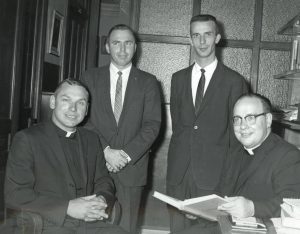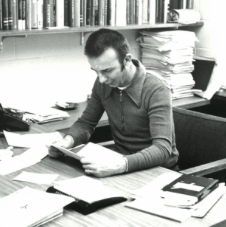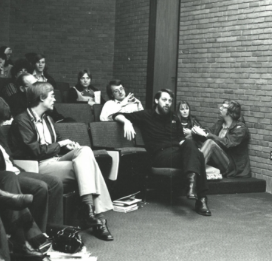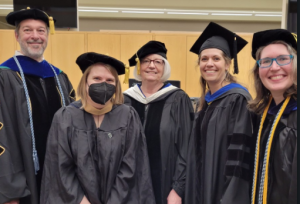By Dr. Raymond Hebert
Thomas More University
Part 46 of our series, “Retrospect and Vista II” Thomas More College/University 1971-2021
In September 1951, Rev. John F. Murphy, STD, succeeded Rev. Joseph Z. Aud as dean and executive administrator of Villa Madonna College. Two years later, in September 1953, Bishop William T. Mulloy demonstrated his commitment to the college by announcing an important change to the title of its executive—president of Villa Madonna College. For a time, Fr. Murphy combined the duties of both president and dean into one responsibility, until Fr. Anthony Deye completed his studies for the doctorate at the University of Notre Dame and returned to the college in September 1956. Deye was appointed academic dean, with an immediate challenge to implement both a concentration program of majors, as well as a core curriculum.

Dr. John Keller, Dr. Jim Becker, and Fr. Cyril Eviston. (Thomas More University Archives)
In her Retrospect and Vista: The First 50 Years of the College, Sister Irmina Saelinger, OSB, opened her chapter entitled, “Expansion of Curriculum – Accreditation” by stating: “Fr. Murphy’s administration (in the 1950s) began with a series of planned activities which led to the expansion of curricula, and additional faculty to carry out the policies and goals of the college, to serve the local community and after to open its services to a wider area in offering a strong liberal arts program and special programs within the framework of liberal arts” (Retrospect and Vista, p.34). This insightful vision is reflected in the validity of these words even now, some seventy years later.
One of the beneficiaries of the expansion of academic offerings in the 1950s was the psychology department. Ironically, Fr. William C. Biers, SJ, a friend of Fr. Murphy’s, had become the executive secretary of the American Catholic Psychological Association in the 1950s and had published a pamphlet entitled: “The Place and Function of the Department of Psychology in a Liberal Arts College,” recommending psychology as a field of study for the future of institutions like Villa Madonna College. Simultaneously, a young faculty member holding a temporary position at Xavier University from 1960–1962, Dr. James A. Becker, had just sent a letter of inquiry to Villa Madonna College, with several letters of reference, all dated December 1961.

Dr. Jim Becker, chair of the psychology department. (Thomas More University Archives)
As noted by Dr. Paul von Ebers of Loyola University of Chicago, where Dr. Becker had completed his PhD, “Dr. Becker is a person of high personal and moral integrity [with] a great sense of responsibility and dedication to his work and to the people with whom he works … whose maturity and judgement are beyond question” (Letter to Msgr. John Murphy, President, December 20, 1961, TMU Archives). With other letters also praising Dr. Becker and suggesting him as a perfect fit for a liberal arts college, Becker was hired in 1962. He was a mainstay at Villa Madonna/Thomas More College for decades, as a faculty member and chair in psychology, and later, founding director of what became a prestigious and trailblazing Cooperative Education and Career Planning Center, and later, director of the Evening, Weekend, and Summer Program.
Loved by the students, particularly for his classes in Statistics for the Behavioral Sciences, Becker was honored as the Outstanding Full-Time Faculty Member of the Year and served as the graduation speaker at the baccalaureate ceremonies in May 1976. He also showed his creativity with non-traditional students over the years, offering a number of classes with titles such as: “Psychology for Mother”; “Child Psychology for Parents”; “Developing a Successful Personality”; and “Adolescent Psychology for the Teen Years.” His classes would fill whenever they were offered. Becker became tenured in 1969, and after several timely publications, was promoted to full professor in 1973. He also served several terms as chair until he transferred to administration in 1975. John W. “Bill” Porter became the new chair of psychology.

Dr. Bill Porter, chair and professor of psychology. (Thomas More University Archives)
Jim Becker must be recognized, however, for not only getting the psychology department up and running, but also for hiring several practitioner adjuncts such as William Feldman and especially Dr. Joseph Willett of the Northern Kentucky Comprehensive Care Center, who then remained as a valuable adjunct for more than three decades. When he was able to hire more fulltime faculty, he added Dr. George Menzer, and later, Dr. Bill Porter and Dr. James Aldridge. Sadly, during the period in the mid-1970’s when finances/enrollment were affected by the opening of Northern Kentucky State College (later Northern Kentucky University), Becker lost one of those positions until he himself moved into administration and could be replaced. Becker’s writing of grants, plus his involvement in the community on multiple boards and as a consultant to a wide range of institutions and religious orders, were all methods of networking to assure that psychology as a discipline would become and remain one of the strongest majors at Thomas More College.
To Thomas More’s benefit, the next department chair also proved to be a pillar of the institution as he took the psychology department to an even higher level, in time even doubling the number of majors. Dr. Bill Porter, with degrees from the University of Denver (BA); Northern Texan University (MS); and Texas Christian University (PhD), with fields in social psychology, abnormal psychology, and perception was 100% a Texas product before coming to Kentucky to teach and southeast Indiana to live. While continuing much that had been started by Dr. Becker, such as the exchange of faculty with Edgecliff College (until it closed) and later with the College of Mount St. Joseph, Dr. Porter saw the wisdom in expanding the number of student majors and minors and partnering with the biology department internally in a projected gerontology program.

Dr. Bill Porter with students. (Thomas More University Archives)
In battling to keep all of the department’s fulltime positions in those difficult late 1970’s, he wrote a letter to the academic dean, James Ebben, and then-interim president, Charles Deters, chair of the board of trustees, reminding them that the “department’s recent success was not accidental” (letter of April 8, 1976, TMU archives). He emphasized that the 90-plus majors were being served by only three fulltime faculty, adding that “we are presently a successful department, but we will probably cease to be successful with a reduction in personnel.” He had made his case, and the numbers generated in the next decades made the case for the addition in time of three talented faculty who all remained at Thomas More for over twenty years: Dr. Maria McLean, Dr. Larry Boehm, and Dr. Kathie Langen.
During the 1990s, the Bill Porter-led vision resulted in a growth in the number of majors to 48 per year between 1993 and 1997 (Psychology Department Annual Report for 1996-1997, TMU Archives). In addition, in its brochure, the department’s promise at the time was that: “The Psychology Department will prepare each student for graduate training in psychology or for a career in a psychology-related field by offering high quality courses and experiences so that students are knowledgeable of the fundamental ideas, findings, and theories of psychology, and so that they are able to design, execute, and interpret experimental procedures” (1997 Psychology Department Brochure, TMU Archives). The result, by the beginning of the 21st century, was not surprising—at least 50% of the graduates with a psychology major immediately pursued postgraduate study.

Dr. Joe Willett, adjunct professor of psychology, who played an important role in the beginning stages of the psychology department. (Thomas More University Archives)
Similar to Dr. Jim Becker, Bill Porter was multi-talented and multi-involved. In addition to his expertise in social psychology, abnormal psychology and perception, he soon became one of the campus’s computer experts. He generously used those skills in his additional roles: interim director of Institutional Effectiveness for two years; a multi-year chair of the pivotal faculty salary committee and even for two years as the assistant for technology to President Rev. Bill Cleves. What cannot be over-emphasized is how important his role was as the champion for the faculty compensation reform efforts. As the chair of the faculty salary committee, he authored a proposal ultimately approved by the college’s board of trustees that can be credited with improving faculty retention at a time when many of the most talented faculty were giving consideration to moving to other institutions.
Along the way, Dr. Porter was selected as the Outstanding Full-Time Faculty Member of the Year in 1991-1992. In addition, he was nominated by the college president, as well as its vice president for academic affairs (Dr. Ray Hebert) in 1991 for the “Sears Roebuck Foundation Teaching Excellence and Campus Leadership Award.” He was one of the national finalists. Dr. David Everett Blythe (English department), in his reference letter for Porter, stated: “We all prize merit in a teacher who changes, who improves and who teaches us: this award would signify this truth that Bill Porter is with students and colleagues alike among the best of the kind.”

Current Thomas More University psychology department faculty members. (Thomas More University Archives)
Dr. Porter’s chair at the time, Dr. Larry Boehm, added that “Bill Porter always displayed an appropriate balance of professionalism and lighthearted wit” (File of Bill Porter evaluations; Letters of Reference, TMU Archives). Not surprisingly, when Bill Porter was asked about his greatest legacy, he said in one of his “Self-Assessments” that “he had helped students with acceptances at Psychology Research Conferences every year except one between 1981 and 1996” (File of Bill Porter Self-Assessments- 1990s, TMU Archives). He always put the interests of the students in the forefront.
Finally, in a post-Bill Porter era, Thomas More College/University would again be privileged to have the fulltime faculty that followed Bill Porter and Jim Becker in continuing the tradition of excellence. The current team of professors — Larry Boehm, Kathie Langen, and, most recently, Caitlin Powell, Whitney Pugh and Lauren Kleitz — play an important role in taking the department to even higher levels. During the spring of 2022, for example, the statistics show an impressive 83 traditional first and second majors and 10 first and second minors (Spring 2022 statistics, Office of Institutional Effectiveness). In addition, as a part of the university’s expanded Digital Graduate and Professional (DGP) program, the department has agreed to offer a new 100% online accelerated bachelor’s degree in psychology. The brochure states that the program was designed to “meet students where they are, individuals can transfer up to 90 credit hours, allowing them to quickly finish their degree. This program prepares students with critical skills for evaluating the veracity of content in our increasingly digital age” (DGP Psychology Program Information Packet).
In short, the tradition established originally by such faculty “legends” as Jim Becker and Bill Porter lives on in the talented psychology department faculty of this centennial Year of 2022.
Dr. Raymond G. Hebert is a Professor of History and Executive Director of the William T. Robinson III Institute for Religious Liberty at Thomas More University. He has just completed his 46th year at Thomas More and, with that background, will now serve as the General Editor of the official history of Thomas More College/University from 1971-2021. With a projected title of RETROSPECT AND VISTA II, it will serve as the sequel to Sr. Irmina Saelinger’s RETROSPECT AND VISTA, the history of the first 50 years of Thomas More College (formerly Villa Madonna College). He can be contacted at hebertr@thomasmore.edu.
We want to learn more about the history of your business, church, school, or organization in our region (Cincinnati, Northern Kentucky, and along the Ohio River). If you would like to share your rich history with others, please contact the editor of “Our Rich History,” Paul A. Tenkotte, at tenkottep@nku.edu. Paul A. Tenkotte, PhD is Professor of History and Gender Studies at Northern Kentucky University (NKU) and the author of many books and articles.
























